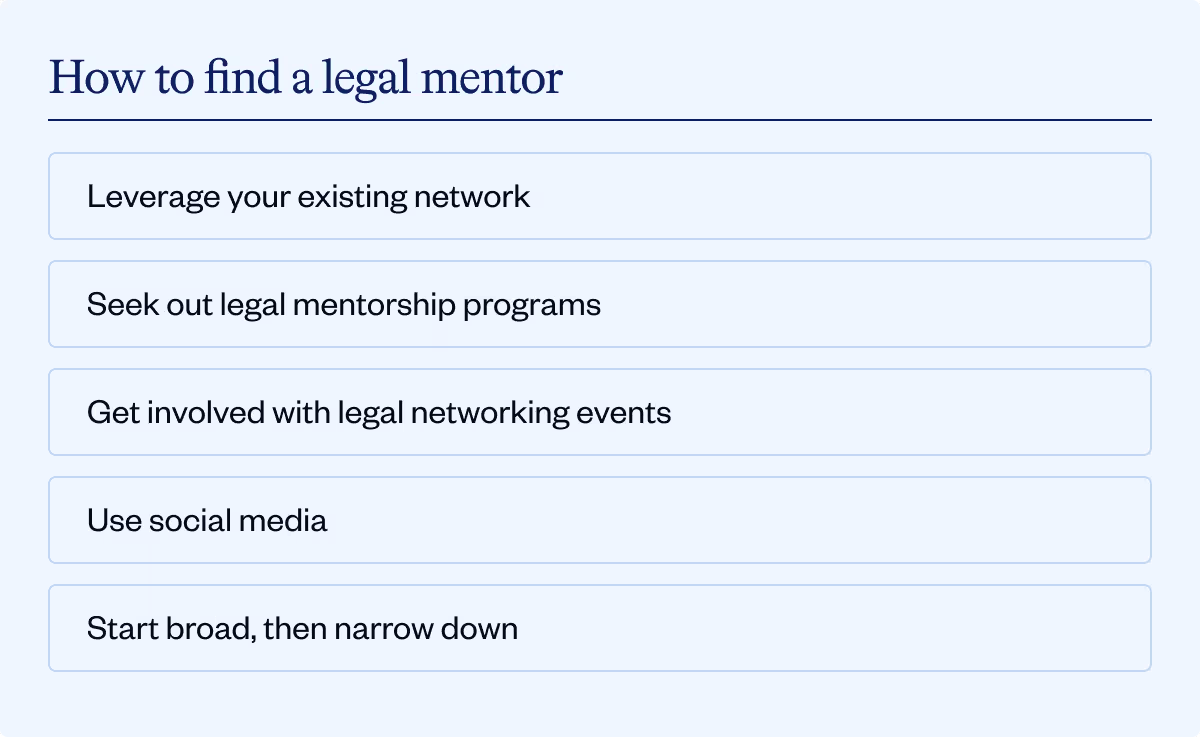Let’s face it—law school, for all its rigor, does little to prepare one for the complex realities of legal practice. It doesn’t fully prepare you for the crushing deadlines, the constant battle to prove yourself, the improvisations, the occasional struggles with work-life balance, and the business side of legal practice.
This makes legal mentors not a mere nice-to-have but a mission-critical necessity. A good mentor offers more than advice. They give you perspective, hold you accountable, and connect you to opportunities you might never reach alone.
They've been in the trenches, faced the same struggles, and come out stronger with lessons that can empower you to burst through limitations, fast-track your growth, and ultimately build a career that truly inspires you.
Here’s everything you need to know.
Who is a legal mentor?
A legal mentor is a seasoned legal professional who offers guidance to less experienced colleagues, drawing from their own experiences, wins, and lessons to help mentees make better decisions about their lives and careers.
A legal mentor acts as a trusted advisor who you can always talk about your struggles, successes, and unconventional thoughts.
Alongside career and personal advice, a legal mentor positions their mentees to take advantage of opportunities. Your mentor allows you to tap into their network, building solid connections and expanding your professional cycle.
They also help you stay updated with industry conferences, networking events, and other opportunities that will positively impact your career.
It is possible to have multiple mentors, each benefiting a different aspect of your personal life and career.

Source: Gary Miles via LinkedIn
Why you need a legal mentor
“The concept of mentoring actually goes back to ancient Greece, where young men were taught important social, spiritual, and personal values. I guess if it was good enough for the ancient Greeks, it's good enough for us today.”
~ Adam Glick, ex-Head of Legal, Intercom
Cultivating Meaningful Connections for In-House Legal Success
Regardless of how far you’ve come in your legal career, we cannot overemphasize the importance of having a legal mentor. There’s always someone with more experience, insights, and resources.

Having such a person as a legal mentor can benefit you in several ways, including but not limited to:
#1 Guidance on career building and advancement
This is especially useful if you're in the early stages of your legal career. A legal mentor can help you set realistic goals with proven strategies to achieve them. They can also share insights about various legal career paths. That way, you can minimize trial and error and avoid pitfalls.
Also read: Top Legal Careers for the Future You Need To Know
With respect to career advancement, your legal mentor can provide tips on when and how to move on to the next phase of your career. This covers promotions, partnerships, or lateral moves within your industry.
“I've had this really fortunate opportunity throughout my career to have very dynamic and supportive managers and mentors who always wanted me to get additional skills or insight.”
~ Doug Luftman, CLO, Trust & Will
The Key to Success as an In-House Legal Counsel & Leader
#2 Accountability
When you get a legal mentor, they naturally become your accountability partner. You’re obligated to keep them informed about your goals, how far you’ve gone in achieving them, and how you’re coping with challenges.
A good mentor will see through your excuses and won’t let you get complacent. They’ll challenge you to stay sharp, improve your arguments, and constantly push beyond your comfort zone.
They’ll set deadlines for goals and expect you to meet them because, in their eyes, there’s no room for the “almost” mentality. And when you do slip, you trust them to not only deliver brutally honest feedback but also encourage you to fall back on track.
#3 Access to unadvertised opportunities
Many of the best legal opportunities—partnership tracks, big cases, and other high-value gigs—aren't listed on public platforms. They’re passed around in private circles, available only if someone on the inside is willing to vouch for you.
Without a mentor, you’re often left on the outside looking in, missing out on opportunities that could shape your career.
#4 A supportive network and lifelong friendships
“The best tool you have as a lawyer is your network.”
~ With Katayoon Tayebi, Associate General Counsel, FIGS
Accelerating Your Career as In-house Counsel
Your mentor can open doors to a network you may not be able to access on your own. And it’s not just about handshakes and LinkedIn connections. Your mentor will push you into circles that matter, where career-defining opportunities are forged over shared struggles, triumphs, and late-night conversations.
These connections can transform into lifelong friendships, offering you an ever-present support system that will back you when the pressure peaks.

Source: Nyssa P. Chopra via LinkedIn
How to find a legal mentor

Source: The Lawpool via LinkedIn
Having a good mentor might be all you need to turn your career around. However, finding the right one isn’t always a breeze. There are several ways to go about this. But in the end, you must be ready to commit time, effort, and strategic thinking to the process.

Here are some proven approaches you can consider:
#1 Leverage your existing network
Your mentors are often closer than you think. So, before you start casting a wide net, it is wise to check your immediate connections.
If you’re employed in a law firm or corporate organization, start by considering more experienced colleagues who have a track record of professional excellence.
If you're a member of your law school's alumni forum, consider reaching out to a potential mentor from that network.
Furthermore, you can tap into your bar association, legal societies, and other professional groups to find someone willing to mentor you.
#2 Seek out legal mentorship programs
Law schools, bar associations, and other legal societies typically offer mentorship programs structured to help members with varying degrees of legal experience connect with each other.
The American Bar Association (ABA), for example, has multiple mentorship initiatives for legal professionals in different categories.
You can always use Google to search for legal mentorship programs in your region.

#3 Get involved with legal networking events
Networking events, Continuing Legal Education (CLE) seminars, and conferences are great opportunities to meet potential mentors. To get the best results, pay more attention to events that attract experienced professionals in your practice area.
Volunteer as much as you can in these events to make yourself more visible and increase your chances of having a conversation with your potential mentor.
#4 Use social media
LinkedIn, for instance, is teeming with thousands of lawyers sharing their unique perspectives about trending issues in the industry. But while this is a place to have a good read, you can also leverage it to make strong connections and even find your ideal mentor.
Make sure your LinkedIn profile is professional and updated. Use the platform’s search features to find legal leaders with similar interests and career paths. Once you identify a potential mentor, send a connection request and engage meaningfully in their posts.
After a few days of engaging with their posts, you can message them directly, expressing your desire to become their mentee. When reaching out to them, be clear about your goals, why you feel they’ll be a great mentor, and what you can bring to the table.
Also read: Leveraging Social Media to Build a Legal Brand
#5 Start broad, then narrow down
It’s often easier to get mentors through formal mentorship programs. But with informal mentoring relationships, you must build them organically over time.
In this case, the key is to start broad. Build relationships with as many professionals as possible whose experiences and achievements you admire. You can do that by volunteering for programs they're part of, interacting with them on social media, or just meeting them at networking events.
Once you’ve had a level of engagement with them over a reasonable period, you can start pitching your interest, knowing that not all will have the time or capacity to commit to a mentoring relationship.

Source: Adam W. Short via LinkedIn
How to create the ideal legal mentor-mentee relationship
A meaningful mentor-mentee relationship calls for a blend of respect, trust, and commitment from both sides. It’s not just about learning tricks of the trade. It’s about building a symbiotic connection where growth is evident on both sides.
For you as the mentee, it's an opportunity to learn from insights that can only come from lived experience. For the mentor, it's a chance to give back, shape the next generation, and view their career through a fresh lens.

However, this kind of relationship thrives on a few non-negotiables, some of which we’ve explained below.
#1 Set clear expectations from the start
Don’t approach a mentor with vague hopes of “learning from their experience.” From day one, you need to get specific. Don’t just say, “I want to grow in my career”—define what that growth looks like.
Are you aiming to break into a new field of law? Interested in securing a leadership role? Lay it all down from the get-go.
Also, have an honest conversation about what the mentor expects from you to make the relationship work.
#2 Understand what your mentor is not
It is important to understand that your mentor isn’t a magician who’ll guarantee your success. Your mentor isn’t meant to hold you by the hand and spoon-feed you.
They’re also not obligated to sugarcoat their views when providing feedback about your performance. Their goal is to make you better, not comfortable.
Your mentor is not a 24/7 helpline who must abandon their personal commitments to attend to you all the time. Respect their time and never breach their boundaries. Your mentor is not the one who’ll make your decisions for you. They’re there to guide and support you, but you’re ultimately responsible for your choices.
#3 Embrace vulnerability
“If you can find someone to mentor you in your career, you should definitely take advantage of the opportunity to sit and learn from them and make sure that you're open and vulnerable. Be honest and forthright with whoever's mentoring you.”
~ Adam Glick, ex-Head of Legal, Intercom
Cultivating Meaningful Connections for In-House Legal Success
A successful mentor-mentee relationship thrives on honesty. Your mentor should be your confidant, someone you can talk about your struggles, failures, and unconventional ideas.
Mentors appreciate when their mentees are open about what’s really happening behind the scenes. This enables them to provide guidance that speaks directly to issues and drives lasting impact.

Source: Gary Miles via LinkedIn
#4 Have a long-term mindset
Growth in a mentorship relationship is not always immediate or measurable. So, expecting a quick payoff is unrealistic.
A mentor’s value often shows in ways you might not notice right away. Trust the process and be patient with yourself and your mentor. Understand that the relationship is a long game, and the benefits are often subtle but profound.
#5 Take Criticism with zero ego
Criticism from a mentor is gold. Embrace it and act on it like your career depends on it—because it very well might.
If your mentor highlights problems with your performance, don’t hide behind excuses. It’s their job to spot your weaknesses and help you fix them. Take the hit, absorb the lesson, and immediately figure out how to improve.
#6 Be consistent with your show of commitment
Your mentor will invest in you as much as you’re willing to invest in yourself. No mentor will go the extra mile for someone who half-asses everything.
Each meeting with your mentor should be treated like a golden opportunity. Come armed with updates, questions, and clear examples of how you’ve implemented their previous guidance. If they give you assignments or suggest steps to take, dive in and take action.
If your mentor sees you taking initiative—acting decisively on their recommendations and relentlessly pursuing growth—they'll respect you and be even more invested in your success.
#7 Give back to the relationship
A mentorship shouldn’t be a free ride. If you don’t add value, you might not get the most out of the experience.
Even if the mentor is more experienced, there are definitely small ways you can give back. No need to overcomplicate your efforts, just start with the low-hanging fruits.
For example, if you're well-versed in technology, you can help your mentor figure out how to use specific tools (like AI) to make their jobs easier. You can occasionally assist them with tasks like document organization, research, event planning, etc.
Finding ways to bring value can go a long way toward strengthening your bond, making the relationship even more productive.
Moving on
Mentorship is a time-tested practice, and many successful legal professionals attribute their achievements to guidance from their mentors. Their stories are not rare exceptions—they are simply evidence of what’s possible.
Legal mentorship gives you the opportunity to tap into the experience of someone far ahead of you. You draw from their successes as well as lessons from their past challenges, shaping a career that defies limitations, outpaces expectations, and positions you as a positive example to others.
Speaking of learning from experiences, you can take advantage of The Counsel Corner, our treasure trove of wisdom where hundreds of seasoned legal experts share their journeys, insights, and hard-earned lessons.
Through The Counsel Corner, you can learn, grow, and become a better legal professional, one story at a time. Click here to get access.


.avif)







